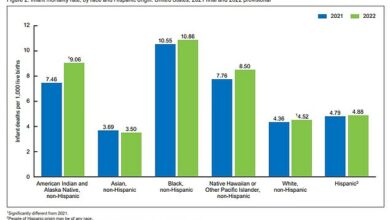This May Be the Most Overlooked Covid Symptom

In January 2020, a man who would later become known as the first documented A Covid-19 patient in the United States arrived at an emergency room.
Two of his symptoms, cough and fever, were among those that would later become known as the telltale symptoms of Covid. But the patient had also been suffering from nausea and vomiting for two days.
Many of us associate Covid with respiratory problems. But some people who get sick with the virus never experience a sore throat, cough or body aches, said Dr. Peter Chin-Hong, an infectious disease specialist at the University of California, San Francisco. Some people feel more like they have food poisoning than anything else.
That’s because the coronavirus is “like dropping a bomb into your body,” says Dr. Ken Cadwell, a professor of medicine at the University of Pennsylvania who studies how Covid affects the gut. “You’re going to feel that in multiple organs, not just the lungs.”
With Covid cases on the rise and so-called “FLiRT” variants causing a new summer spread, here’s how to recognize and manage the lesser-known gastrointestinal symptoms.
Recognizing and solving stomach complaints
Some people experience gastrointestinal symptoms in the first few days of infection, before they develop fever and cough. But many people who only experience stomach symptoms “never think of it as Covid,” Dr. Chin-Hong said.
Diarrhea is a common gastrointestinal symptom related to Covid, Dr. Chin-Hong said. People may also lose their appetite and experience nausea, abdominal pain and vomiting.
Covid doesn’t look the same every time you get infected, said Dr. Davey Smith, an infectious-disease specialist at the University of California, San Diego. You can have cold and flu symptoms during one bout of the virus, and gastrointestinal symptoms the next. Paxlovid, an antiviral drug that reduces the risk of severe illness, can also cause diarrhea.
Hydration is important for anyone with COVID, but drinking enough fluids is crucial if you have diarrhea or vomiting. If you have trouble keeping food down, stick to bland foods like toast and bananas, said Dr. Adrienna Jirik, a gastroenterologist at the Cleveland Clinic.
People who share a bathroom can take steps to avoid contaminating the space with the virus particles in their feces, such as opening a window to improve ventilation.
A refresher on other Covid symptoms
The most common variants currently circulating appear to cause the same symptoms seen with other recent strains of the virus.
In addition to digestive problems, people often experience sore throats, congestion or runny noses, headaches and muscle aches, fever or chills, coughing and fatigue. In severe cases, they may have trouble breathing. Although some people who get sick lose their sense of smell or taste, that symptom is much less common now than it was earlier in the pandemic.
All of these symptoms can occur days after spending time with someone who has the virus. If you know you’ve been exposed, it’s important to watch for all symptoms, including gastrointestinal symptoms, Dr. Chin-Hong said.
“If everyone in your house has Covid and you have diarrhea, you have to put two and two together,” he said.




